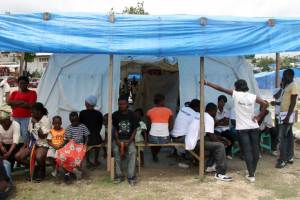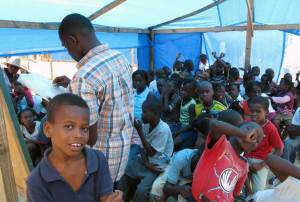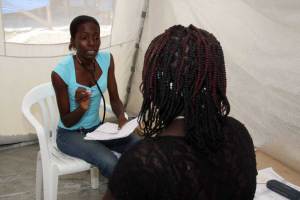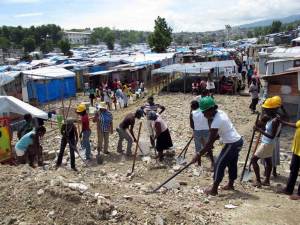American Refugee Committee at Acra
American Refugee Committee International (ARC) is dedicated to assisting refugees, displaced people and host communities in taking control of their lives and achieving self sufficiency. As Melanie Megavand, the protection coordinator at the Acra tent camp put it: “We’re pretty dedicated to working ourselves out of a job.”
Although ARC wasn’t present in Haiti prior to the January 12, 2010 earthquake, it hit the ground running with an emergency response team arriving three days later. The team’s first task was to figure out what its role should be. A lot of spontaneous camps were already springing up and ARC thought it was important to provide management to the large camps, something it specializes in doing. Coordinating with the U.N. and other aid organizations, ARC assumed management of the largest camps within a couple of weeks.
The process for doing this involved the response team meeting with members of households that had already formed ad hoc governments in the camps. The team developed a mapping exercise in order to determine what assistance the camp governments needed. The most pressing needs turned out to be a clinic and child safe spaces, a sort of daycare where parents could leave their children while they worked if they had a job, or just tried to begin putting their lives back together if they didn’t. Meanwhile, other aid organizations, among them Solidarite and Catholic Relief Services, came in and began working on providing basic infrastructure, including latrines and showers.
The child safe spaces are designed to provide a routine for children in emergency situations. In addition to giving children a safe place to play, the program also offers some informal education. Currently, the program serves 700 children a day, three to ten year olds from 8 a.m. to noon and ten to fourteen year olds from 2 p.m. to 4 p.m. The older children attend school in the morning.
According to Dr. Alerte Tshianda, ARC’s health coordinator, the clinic, as would be expected, initially dealt primarily with trauma cases resulting from the earthquake, but has now transitioned to dealing with more routine cases in the context of tropical diseases. With the arrival of the rainy season, the clinic is seeing more cases of typhoid, malaria, dengue fever and general diarrhea. The clinic also operates a mobile clinic that makes house, or tent, calls. In addition, the clinic works with the Haitian Ministry of Health to refer patients for specialized care. Once the patients’ special needs are addressed, the clinic monitors their condition.
In addition to providing the foregoing services, ARC operates a gender based violence program, whose goal is to prevent sexual abuse in the camp. Protection of women is at the heart of its design. To encourage women to come forward to discuss their concerns, ARC has established an anonymous complaint mechanism. This allows ARC to identify vulnerable women and provide them with counseling. In the worst case scenario, ARC cares for rape victims, whom it calls “survivors” to emphasize their ability to recover.
A recent addition to ARC’s program set is Cash for Work. This program employs 500 people, 200 of whom are women, in a two week rotation. The reason for turning over the workforce every two weeks is to allow everyone to get a chance to work, both so they will be able to earn some money and to prevent conflict. The goals are to ensure that people have enough money for basic expenses and to provide them with a sense of dignity. The work itself involves a variety of tasks, but so far the principal one has been clearing rubble. The money from salaries currently comes from private donations to ARC, although in the future the United Nations Office for Coordination of Humanitarian Aid (UNOCHA), USAID, the International Organization for Migration (IOM) and Unicef may contribute.
Although historically ARC’s role has been to offer immediate emergency relief and then leave as soon as the situation stabilizes, Melanie said that Haiti may be the exception to the rule. She sees the possibility of ARC staying and moving into longer term development work once the immediate crisis passes. ARC has “Huge hope in Haitians and their capacity to bounce back” and just might stick around to help them do it.






